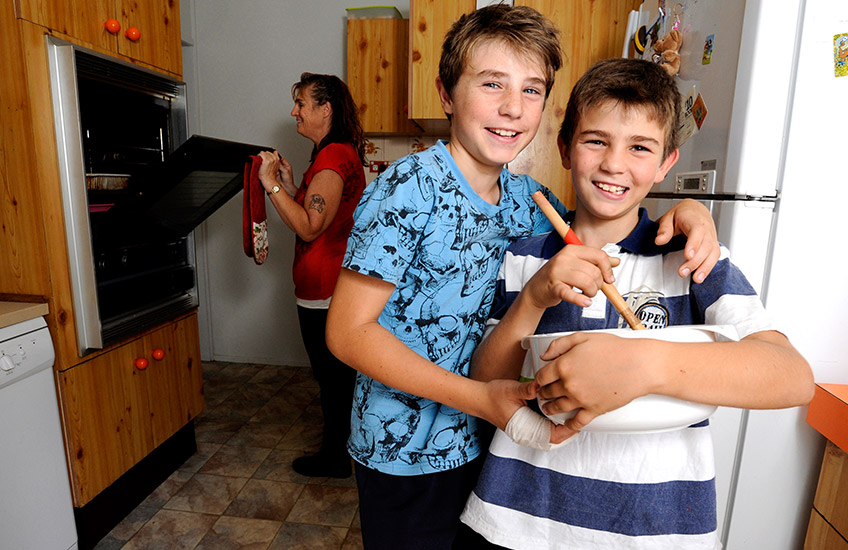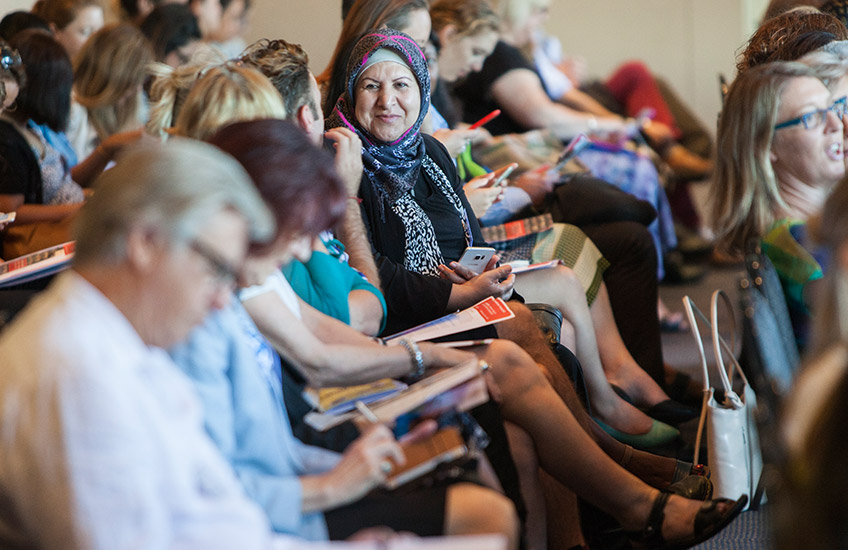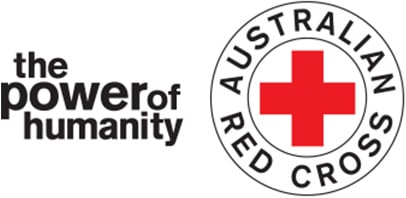
Chelsea*, pictured with her sons Dale and Ashton, participated in a Red Cross nutrition and cooking program. "Afterwards I felt more in control and my depression levels seemed to go down," Chelsea says. "My self-esteem has just skyrocketed, and that flows into my attitude to the kids."
*Names have been changed to protect the privacy of the individuals.
Australian Red Cross/Renae Droop
While technological advances are creating more ways to connect people, more than 825,000 Australians all over the country still experience deep social exclusion. Meanwhile, other types of disadvantage continue to be concentrated in a number of communities. People experiencing intergenerational disadvantage are more likely to live below the poverty line, have a disability, be homeless, be from a refugee background, be Aboriginal or Torres Strait Islander, and/or involved with the justice system.
Many refugees and people seeking asylum also face discrimination and destitution, combined with the psychological impact of uncertainty as they encounter lengthy visa processing delays and prolonged detention.
This year we sharpened our focus on people who are deeply socially excluded, providing services to help break the cycle of disadvantage.
New partnerships for health
While celebrating 15 years of our successful partnership with Sanitarium, we welcomed a new $300,000 partnership with ALDI to further build on our nutrition and food security programs. With ALDI’s support, we are training 100 facilitators to deliver community nutrition programs, helping people facing hardship to eat regularly and well on a budget. Other benefactors have contributed a further $915,000 over the next three years in NSW, and $200,000 in SA to support our food security work.
We supported more than 22,800 socially isolated people over 65 to become more connected to their communities
Red Cross was a finalist in the 2016 Queensland Government Reconciliation Awards for our community-based work in remote Woorabinda
Under our Strategy 2020, we are taking a bolder and braver approach to humanitarian advocacy on behalf of the most vulnerable. This year we advocated for universal access to healthy, affordable food by becoming a founding member of the Right to Food Coalition and co-sponsoring an issue of national homelessness publication Parity, which shared information on the issue with more than 600 industry and government subscribers.
Rethinking justice
We’ve also stepped up our advocacy for the humanitarian needs of people involved with the justice system. The number of people in Australian prisons has doubled in the last 20 years, while overcrowded prisons are costing the country $3.4 billion a year to run. We believe it makes sense to reduce the flow into prisons, rather than building more.
Evidence shows that a large proportion of people in prison are disadvantaged. Aboriginal and Torres Strait Islander peoples are incarcerated at 13 times the rate of the general population, and people with disabilities, poor mental health or low income are also over-represented. We advocate for a justice reinvestment approach, where some of the billions spent on prisons would be diverted to addressing the underlying causes of crime and helping disadvantaged people. In March 2016 we published a research paper, Vulnerability Report: Rethinking Justice [PDF] to support this position with compelling data, and propose targets for reduced incarceration rates, especially for Indigenous people.
In October 2015, we showcased the successful Community-Based Health and First Aid program applied in Irish prisons, hosting international speakers from the Irish Prison Service along with Australian corrections ministers and other key stakeholders. These initiatives helped secure more than $1.2 million in funding for Red Cross work in this area.
Help us to spread the word about justice reinvestment and how it can benefit our communities.
Visit redcross.org.au/justicereinvest and join the conversation on social media with #justicereinvest.
Preparing for consumer-centred care reforms
National changes to disability and aged care funding introduced this year represent significant reforms to the community sector. Governments will shift from funding providers of services to providing individual consumers with funds; the recipients can then choose a service provider that meets their needs. We have developed a three-year readiness implementation plan to adapt to this major shift, which will be critical to our future role and relevance in this area. We intend to focus on the most vulnerable people, ensuring their needs are met and they are able to effectively use the new system.
Embracing innovative solutions
A key element of our strategy is embracing innovation and exploring new ideas. In April we partnered with non-profit movement Techfugees to explore how technology can help refugee families as they settle in Australia. We are now looking to support several of the ideas developed during the hackathon, starting with an ‘Interpreter Central’ website which will better enable caseworkers and clients to preview, book and review language interpreters. This will complement our wide range of existing programs supporting refugees and people seeking asylum, providing them with casework assistance, emergency relief grants, social support and other services.

The 2016 National Practitioners' Forum brought together staff and volunteers in the community sector, as well as researchers, policy-makers and other stakeholders, to explore issues and ideas in supporting vulnerable migrants.
Australian Red Cross/Rodney Dekker
International response to migration
Also in April we co-organised the first combined, regional Red Cross Red Crescent movement summit on migration issues. Together with Red Cross delegates from Pakistan, Sri Lanka, Bangladesh, Malaysia, Indonesia, Myanmar, Kiribati, Solomon Islands and Tuvalu, we pooled together a wealth of experience and knowledge, and sought ways to better respond to the practical and humanitarian challenges presented by migration. We will continue to play a leading role in promoting a cohesive, global Red Cross approach to addressing the needs of vulnerable migrants. We also held a public practitioner’s forum, bringing together leading experts and workers in the migrant support sector to explore issues and ideas for greater social cohesion in Australia.
Restoring family links
We celebrated 100 years of our international tracing service, where Australian Red Cross works with the global Red Cross network to track down family members missing as a result of war, conflict, disaster or migration. A centenary exhibition in Melbourne, Adelaide and Sydney helped to generate better public understanding of the work we do in tracing as well as build support for our wider services. Liaising directly with clients, our tracing staff worked tirelessly to find out the fate or whereabouts of more than 1,800 people this year.
We made 46 visits to immigration detention facilities in Australia to monitor conditions and treatment of detainees
More than 1,700 refugees and asylum seekers (including 500 children) received emergency relief grants or material aid
More than 7,200 people seeking asylum and living in the community received non-material support and services
We worked with 80 people who had experienced trafficking or forced marriage. This included girls, men and women, 9 to 60 years old, from over 28 countries
Do you know fact from fiction about refugees and people seeking asylum?
Find out at redcross.org.au/refugees.

